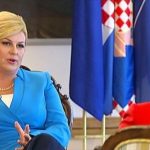ZAGREB, March 19, 2019 – Croatian Foreign and European Affairs Minister Marija Pejčinović Burić said in Brussels on Monday that the protests which took place over the weekend in Belgrade were Serbia’s internal matter, adding that democratic stability in Southeast European countries was important for Croatia and for the European security.
“I cannot comment on what happened in Belgrade yesterday. I believe this is Serbia’s internal matter, but I can say generally that democratic stability in all Southeast European countries is exceptionally important for Croatia and for the European security,” said Pejčinović Burić, who is taking part in a meeting of the EU foreign ministers.
The Serbian opposition has been staging largely peaceful rallies for weeks but tensions escalated on Saturday when crowds stormed the state TV station.
The protests in Belgrade over the weekend saw demonstrators storm the headquarters of the RTS public broadcasting service, surround the Presidency building and clash with the police. They ended on Sunday evening with an ultimatum issued to the authorities to release the protesters who were arrested for invading the RTS building by 3pm on Monday.
Asked about Serbia’s progress on its EU journey and whether Croatia was resolving bilateral issues concerning the policy chapter 23, Pejčinović Burić said Croatia supported the EU path of all its neighbours, but that they had to meet requirements that were the same for every country.
“What kind of progress Belgrade has made on its path to the EU will be visible in a report on Serbia. We surely support the EU path of all our neighbours but the same rules apply to all countries and everyone must meet the set benchmarks. Serbia knows very well that without meeting those requirements it can hardly make progress in that process,” Pejčinović Burić said.
Before the meeting in Brussels, the EU ministers talked to Macedonian Foreign Minister Nikola Dimitrov about North Macedonia’s European journey, underlining the importance of the Treaty of Prespa, an agreement reached between Greece and North Macedonia under the United Nations’ auspices, resolving a long-standing dispute over the latter’s name.
Stressing the importance of the Treaty of Prespa for the stability in Southeast Europe, Pejčinović Burić expressed hope North Macedonia could receive a green light for the start of its EU entry talks in June.
More news about relations between Croatia and Serbia can be found in the Politics section.








